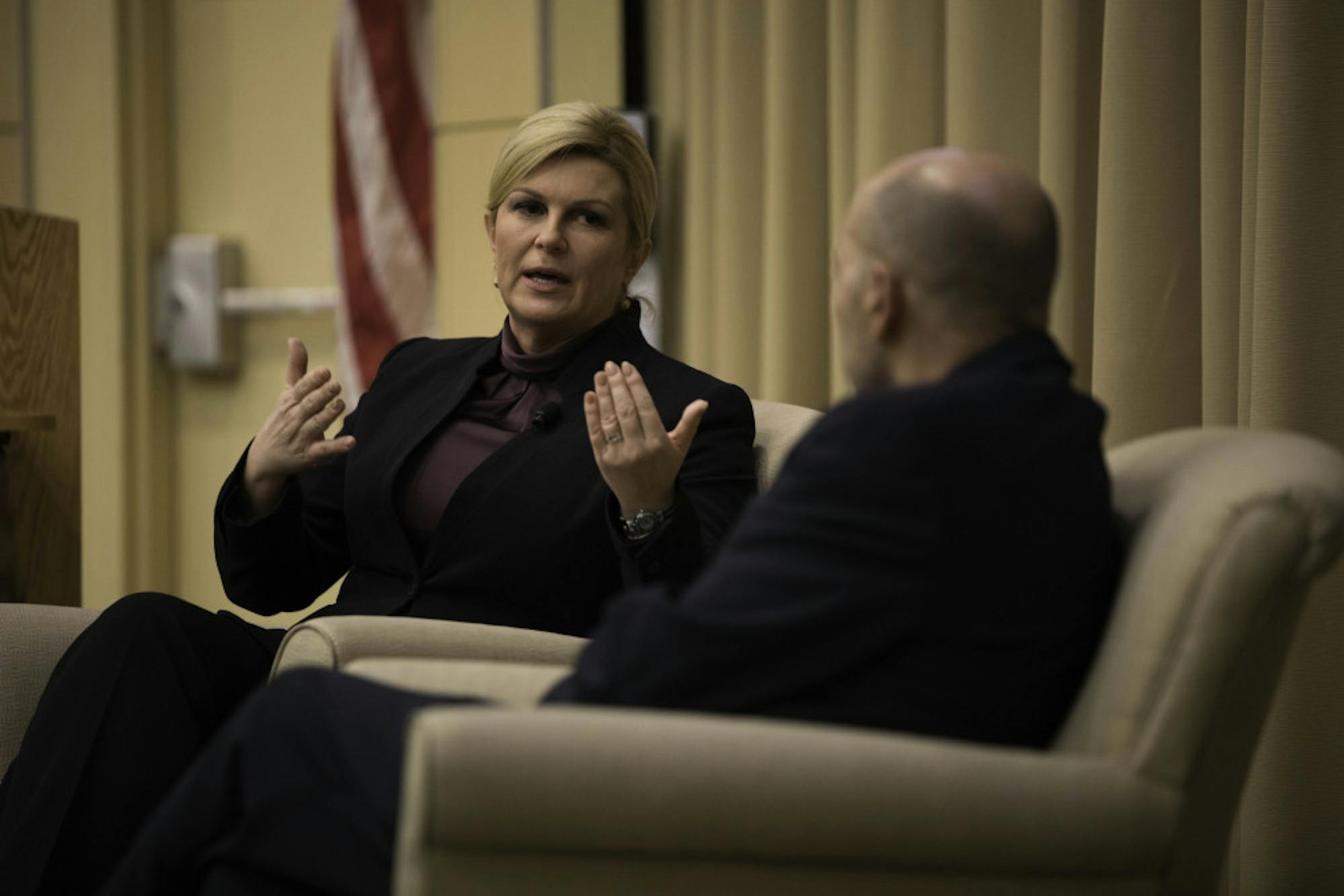Kolinda Grabar-Kitarović, President of the Republic of Croatia, spoke about her multi-dimensional approach to foreign policy in front of a full crowd at ASEAN Auditorium on Monday night. Her talk was part of the Charles Francis Adams Lecture series.
The Republic of Croatia suffered internal turmoil in the 1990s as the result of a destructive yet successful war for independence from Yugoslavia. Following a close election in January 2015, Grabar-Kitarović was elected as the first female head of state.
James Stavridis, dean of The Fletcher School of Law and Diplomacy, introduced Grabar-Kitarović as a politician who is first and foremost a diplomat. He praised Grabar-Kitarović for her judgment, expertise and wisdom and then praised Croatia for its friendly people, natural beauty and delicious wine.
Grabar-Kitarović’s lecture centered around southeast Europe, Croatia’s role in the EU, and the transatlantic relationship between Europe and the United States.
Early in her lecture, Grabar-Kitarović established that she wished to use the term “Southeast Europe” to refer to area known as the Balkans. She said this is because the Balkanization has become “a global trope for dissipation, for fragmentation, for war, for instability.”
Grabar-Kitarović said that although it is easy for a country to remain confined, it can also choose to find its niche and become a small power. In the future, she wants Croatia to help bring about peace and stability in the neighborhood of southeast Europe.
“What I want for Croatia is to be a lot more assertive — to be a lot more of a leader rather than a follower," she said.
In regard to the EU, she says it has become more inward-oriented, especially with the influence of Brexit. Grabar-Kitarović said the consolidation of European countries is necessary and lamented that progress has been stalling.
“We’re losing the hearts and the minds of the people because the people are becoming disheartened by the fact that they think that they’re not good enough,” Grabar-Kitarović said. “We don’t need just rhetorical assurances. What we need is complete and concrete steps of these countries to make progress on the road to EU membership.”
In regards to migration, Grabar-Kitarović said that everyone has a right to a better life. She explained how the majority of migrants were men aged 16 to 45, meaning that helpless women and children were left behind.
She said that all countries need to work together to assuage the situation and deal with the root causes of migration, a slow but necessary process that will take decades. She predicted that number of migrants will soon rise from 16 million to 200 million.
“The European Union has to step up to the plate,” she said. “We have the means but we need the courage, the leadership, vision, the foresight. We need a strategy on how to deal with the problems in our neighborhood.”
Grabar-Kitarović said the Three Seas Initiative is an effort to reduce the difference between former Eastern Bloc countries and the rest of Europe. If interpreted as "Three Cs," the initiative revolves around cohesion, connectivity and competitiveness, she said.
The initiative aims to level the playing field by helping countries in southeast Europe to increase energy independence, transportation infrastructure and digital connectivity, according to Grabar-Kitarović.
“Talking about the European Union today, I very much dislike the language of core versus periphery — and as I mentioned — of old versus new, east versus west,” she said.
As a self-proclaimed “Transatlanticist,” Grabar-Kitarović talked about the value of maintaining a strong relationship between countries. She said that since last year, Croatia has increased its defense spending by 9 percent, making its contribution high in terms of per capita numbers.
Ultimately, Grabar-Kitarović concluded by saying small countries like Croatia can make a difference in global politics.
“You can see that regardless of your size in terms of geography or population, it is actually about your will," she said.
Grabar-Kitarović then transitioned to a question-and-answer session led by Stavridis.
Stavridis asked Grabar-Kitarović about Croatia’s complicated relationship with Russia, to which she replied that Russia is a strong international power and must be treated as such. She emphasized that Southeast European countries joining the EU is not a move against Russia, rather, it is just beneficial for themselves.
Grabar-Kitarović also said there needs to be a change of mindset in regard to women holding positions of power. She lamented that jobs are heavily gendered, and that many girls do not grow up thinking they hold the same value as men.
“It’s not only the right thing to do in terms of justice and morality and integrity, but it’s just an incredibly pragmatic thing to do,” Stavridis added. “When you look at the untapped productivity of women in the world today, it’s been estimated somewhere between $9 and $13 trillion.”
As for Brexit, Grabar-Kitarović said she was uncertain that the UK would actually leave the EU. She said the negotiations would be protracted, and regardless of the outcome, the UK would remain an integral part of transatlantic relations.
There was only time for a few audience questions, one of which was from a Bosnian who suggested that Grabar-Kitarović was supporting indicted war criminals.
Grabar-Kitarović defended herself and said that she regretted every victim who had been affected by the war — whether they be Croat, Serb or Bosniak. She said she was not overlooking the past but also saw this as closing that chapter in the history books and an opportunity to look to the future.
“I will do whatever is in my power in order to improve the relations not just between Croatia and Bosnia and Herzegovina, but between the Croat and the Bosniak and the Serb nations in Bosnia and Herzegovina," she said.






